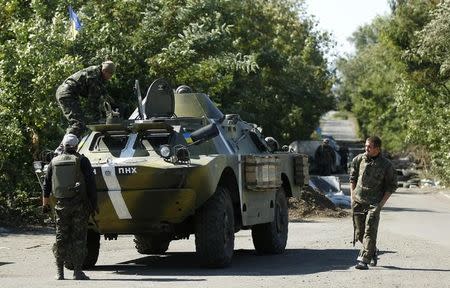EBRD warns post-Cold War "peace dividend" at risk

By Marc Jones LONDON (Reuters) - The European Bank for Reconstruction and Development warned on Thursday that the crisis over Ukraine could erode some of the economic "peace dividend" eastern Europe gained when the Cold War ended. It said conflicts in the region, which are disrupting trade and diverting government spending, made its economic forecasts "subject to an exceptional degree of uncertainty and downside risks to the economic outlook are high." The organisation shaved another slice off its regional forecasts for the year, predicted Russia would dip into recession in 2015 and urged the European Central Bank to consider quantitative easing to revive the economy. The EBRD, which monitors central and eastern Europe and some of Europe's neighbours in Asia and North Africa, trimmed 0.1 percentage point off its 2014 forecast for the overall bloc to leave it at an anaemic 1.3 percent, less than half of what it predicted at the start of the year. "The region is in the heavy shadow of the Ukraine/Russia crisis," said EBRD Chief Economist Erik Berglof. "Permanently higher military spending ... in response to the renewed geopolitical risks, could erode the peace dividend from the dissolution of the Soviet Union," the EBRD said. The West has accused Russia of sending in troops and weapons to bolster separatist rebels in eastern Ukraine in more than five months of fighting that has killed over 3,000 people. A shaky ceasefire is now in place. Russia denies sending in troops. After months of conflict Ukraine's economy is now expected to shrink by 9 percent this year versus 7 percent forecast in May. The development bank made no changes to its previous prediction that Russia will stagnate this year but said it now expected a mild -0.2 percent recession there next year. Having been falling for years, military spending is starting to rise again in Russia and Ukraine, and similar noises are being made elsewhere in Europe. In Russia, it is expected to top 5 percent of gross domestic product (GDP) this year for the first time since the Soviet Union split in 1991 and in both Russia and Ukraine it has been going up in percentage terms for the last three years. Poland also plans to increase its spending. This means potentially less money available for improving infrastructure and other economically-beneficial investments. "We would argue it is also quite important in the rest of Europe if you listen to the conversations around defence spending, or even in the UK," Berglof told reporters. ECB QE COMPELLING Turkey was one of the few countries where the EBRD upgraded its 2014 GDP forecast, to 3 percent from 2.5 percent. It also nudged up forecasts for Poland, Hungary, Slovenia and Slovakia, despite the uncertainty and trade sanctions over Ukraine. "We see in Turkey an improvement in both the internal balancing and the external rebalancing, so even though growth is slower (than in the past) we think the drivers are healthier," Berglof said. But the EBRD is worried about high levels of bad loans at banks, notably in ex-Yugoslav states, Bulgaria and Romania, and disappointed that the euro zone - eastern Europe's biggest trade partner - has not staged a stronger economic recovery. The EBRD became the second international institution this week after the OECD to call for the European Central Bank to act more aggressively to pump money into the economy. "The case for quantitative easing (QE) has become compelling to support the still fragile recovery in the euro zone, to which much of the CEB and SEE regions are strongly linked," the EBRD said. "An effective euro zone QE may help lessen the risk of setbacks in the recovery of those regions." (for full forecasts click http://www.ebrd.com/pages/homepage.shtml) (Reporting by Marc Jones; Editing by Dan Grebler/Ruth Pitchford)

